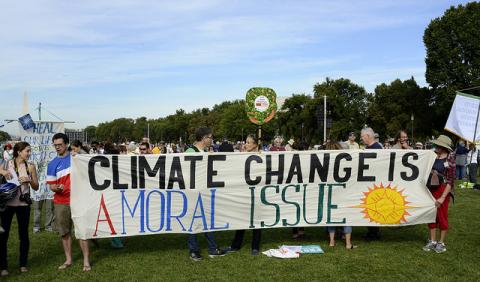
Today is not only the Seventh Sunday of Easter, but also the Feast of the Ascension and the eve of Memorial Day. For those who are not familiar with Memorial Day, it is a day that the people of the United States remember the members of the military who have died in combat. The common theme of these three events is the motif of death.
I mean death, not in the morbid sense, but rather, death as an avenue of transition. One fact that is clear in our complex world is that we are in a constant state of flux. In other words, we are constantly in transition, moving from one moment to the other. As the Greek philosopher Heraclitus said, “No one steps in the same river twice, for it's not the same river and one is not the same person.”
Whether moving from one continent to another, or departing from this life to the next, what eases the heartbreak, grief, and fear of leaving the familiar behind is our understanding on a metaphysical level that all of creation is connected with God. In today’s Gospel reading from John chapter 17, we hear part of what is known as “The Farewell Discourse,” given by Jesus to eleven of his disciples immediately after the conclusion of the Last Supper in Jerusalem, the night before his crucifixion. Jesus describes our connection with God when he says, “Everything of mine is yours and everything of yours is mine, and I have been glorified in them.”
Now there is a particular issue which is threatening our connection with Creation and the planet we call our home: climate change.
Never before in the history of civilization has humanity fathomed that its way of life could bring about the demise of the planet. Through pathological consumption of natural resources and massive output of carbon emissions, the lifespan of our common home – once perceived indefinite – is now metaphorically measured within minutes on the Doomsday Clock.
However, according to experts, there is still a chance that we can reverse this trajectory, but the window of opportunity is closing. It is within this dire context that Pope Francis released his encyclical, Laudato Si’.
Laudato Si’ serves as a wake-up call not only for Catholics but for the entire world, that unless something is done now to care for our common home, the allegorical apocalypse in the Book of Revelation will become a stark reality.
“In this encyclical,” Pope Francis begins, “I would like to enter into dialogue with all people about our common home.” He is addressing not just the faithful but everyone, because regardless of race, religion, or creed, each and every person is connected to this planet and thus has a stake in its survival.
By inviting everyone to the dialogue, Pope Francis demonstrates that climate change cannot be addressed by a few select countries; rather it warrants the involvement of everyone that calls this planet home.
“Interdependence obliges us to think of one world with a common plan. Yet the same ingenuity which has brought about enormous technological progress has so far proved incapable of finding effective ways of dealing with grave environmental and social problems worldwide. A global consensus is essential for confronting the deeper problems, which cannot be resolved by unilateral actions on the part of individual countries.” (Laudato Si’ 164).
Once global awareness of integral ecology – that all things of the world are connected – is established, the illusion of independence is shattered, the reality of interdependence is seen, and an openness and willingness to work collectively will take over. The light of interdependence will melt away the egoic deception of the sustainability and efficacy of independence.
Continuing along this thread of interdependence, Pope Francis is quick to remind us that a healthy ecology is preceded by a healthy anthropology:
“There can be no renewal of our relationship with nature without a renewal of humanity itself. There can be no ecology without an adequate anthropology” (Laudato Si’ 118).
Why, you may ask?
“A misguided anthropocentrism need not necessarily yield to “biocentrism”, for that would entail adding yet another imbalance, failing to solve present problems and adding new ones. Human beings cannot be expected to feel responsibility for the world unless, at the same time, their unique capacities of knowledge, will, freedom and responsibility are recognized and valued.” (Ibid)
Pope Francis is inviting each us to contribute in our own unique way. In the spirit of the words of Leo Buscaglia: “Your talent is God’s gift to you; what you do with it is your gift back to God,” Pope Francis calls us to partake in this global mission in honor of our interconnectedness with God and Creation.
Each and every one of us is a rare and unrepeatable masterpiece of God. Within each of us is a unique and precious talent that only we can give. I believe that this is the divine glory Jesus is expressing in this his “Farewell Discourse.”
Photo: Demonstrators hold a sign that reads “Climate change is a moral issue” outside of the U.S. Capitol Building while Pope Francis speaks before a joint meeting of Congress in Washington, D.C. on September 28, 2015.
